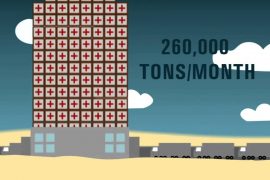The BBC’s Jerusalem Bureau evidently decided that it would be appropriate to do a special feature on the anniversary of the release of Gilad Shalit in exchange for 1027 convicted Palestinian terrorists.
Thus, on the BBC website we see side by side tabs under the heading “Shalit-prisoners exchange: One year on” leading to an article on Shalit (by Yolande Knell) and an interview with a convicted PFLP terrorist by the BBC’s Gaza correspondent, Jon Donnison.
Even before reading Donnison’s interview, the very layout says “equivalence”.
Donnison’s superficial touchy-feely whitewash concentrates on ‘humanising’ a man convicted – according to his own unrepentant admittance – of terrorist activities.
“An Israeli court gave him two life sentences after he was convicted of “intentionally causing death” and working for an “illegal and unrecognised organisation”.
I ask Al Far if all this is true.
“Yes,” he says quickly. “I planned and co-ordinated attacks against Israeli targets.”
I ask him if he regrets what he did. This time there is more of a pause.
“No,” he eventually says.”
Donnison, however, refrains from asking any difficult questions which might humanise those “Israeli targets”: they have no names, ages, family – and certainly, unlike Al Far, no freedom. They are not even spoken of as human beings.
Donnison’s next paragraph lays bare the underlying aim of his article: that same moral equivalence between a terrorist and a conscript in a regular army, which the webpage layout already hinted at.
“Al Far says he saw himself as a soldier in a war, no different from Gilad Shalit – captured by Hamas militants in 2006 – or any other soldier in the Israeli army. Most Palestinians would agree with him.”
Scrupulously avoiding informing his readers of the fact that Al Far’s organization is a proscribed terrorist group responsible for numerous aircraft hijackings, bombings and the deaths of many civilians, Donnison also refrains from detailing the PFLP’s ideology which rejects the two-state solution, the existence of Israel as a Jewish state and promotes the ‘right of return’ for Palestinian refugees. By doing so, Donnison can present Al Far’s basic excuse of “the occupation made me do it” for his involvement in terrorism as though that were a justification and gloss over the rather bizarre statement (unchallenged by Donnison) which actually blames Israelis for terrorism against themselves:
“…but if the Israelis pressured me to carry a gun again then I would.”
Donnison refers – albeit briefly – to the subject of the PA’s financing of former (and current) convicted prisoners:
“Al Far says, as a former prisoner, he is treated with respect. He tells me the Palestinian Authority based in the West Bank pays him a monthly salary to support him. He does not want to say how much, calling it only a “normal amount”. “
However, he fails to expand on the financial details (those released in the Shalit deal were allocated $5 million in PA-donated ‘release grants’ alone), the controversy surrounding the PA’s use of funds donated by the international community to pay monthly stipends to current and former convicted terrorists or the obvious connection between the PA’s preferential treatment of convicted terrorists and the encouragement of future acts of terrorism.
A good investigative journalist could have done important work informing his or her readers on the real stories behind the prisoner exchange. Donnison and his editors chose not to step up to the mark.

Next, Donnison turns to quoting the politicised NGO Addameer – which refers to the Israeli army as “Israeli Occupying Forces” and supports BDS (boycott, divestment and sanctions) against Israel.
“Israel always said it feared many militants would return to violence.” […….]
“But figures from the Palestinian prisoners rights organisation Addameer show only eight of the more than 500 detainees who were released to the West Bank or East Jerusalem are currently back in Israeli jails.”
Contrary to Addameer’s claims, the Israeli defence establishment reports a somewhat less rosy picture:
“The [exchange]deal’s first round saw the release of 477 security prisoners, 209 of whom were deported to the Gaza Strip. According to the data, which was released by Yedioth Ahronoth on Wednesday, many of the Gaza deportees have joined Hamas’ leadership, while others are actively developing weapons and firing rockets on Israel. Furthermore, some are recruiting new terror cells in the West Bank, including one Hebron cell that planted a bomb in Jerusalem and planned to kidnap an IDF soldier.”
“The prisoners who were deported to the West Bank have not abstained from hostile activity, either; over the past year Israel has arrested 40 Palestinians in the territories on suspicion of rioting, throwing Molotov cocktails, transferring funds for terrorist acts and other violations. Twenty-four of them – including two women – are still under arrest. One has been tried and incarcerated.”
Donnison continues to insult his readers’ intelligence with an utterly ridiculous quote – this time from a PA official:
“A spokesman for the Palestinian Authority’s Ministry for Detainees, Amr Nasser, told the BBC such a low level of re-arrests reflected that some of those released as part of the deal should never have been in jail for so long in the first place and were never really a threat.”
More seriously, he winds up by going down the very suspect route of blowing wind into the sails of the ‘narrative’ adopted in some Palestinian circles, according to which terrorists are to be regarded as political prisoners.
“Addameer say there are around 4,600 Palestinian “political prisoners” currently held in Israeli jails. Israel has convicted many of them of acts of violence and terrorism.”
As we are aware, the BBC’s Editorial Guidelines have plenty to say on the subject of undesirable “value judgements” resulting from the use of the word ‘terrorist’, which – it is claimed – may be perceived as compromising the BBC’s impartiality.
“The value judgements frequently implicit in the use of the words “terrorist” or “terrorist group” can create inconsistency in their use or, to audiences, raise doubts about our impartiality.”
“We must be careful not to give the impression that we have come to some kind of implicit – and unwarranted – value judgement. “
So my questions to the BBC are these:
Does the BBC really believe that trying to create an impression of moral equivalence between a self-confessed convicted terrorist and a kidnapped conscript from a regular army does not represent a value judgement?
Can the BBC look its audience straight in the eye and say that the publication of a romanticised puff-piece interview with a convicted terrorist (which studiously avoids presenting full background information or asking any difficult questions and uses quotations containing unverified information from politically motivated bodies working for the same aims as the convicted terrorist himself) should not “raise doubts” regarding its impartiality?
Related articles
- BBC’s Jon Donnison on football and politics. (bbcwatch.org)
- BBC coverage of recent rocket attacks on southern Israel (bbcwatch.org)
- BBC tunnel vision in Gaza (bbcwatch.org)
- BBC’s Jon Donnison on Salafists and Hamas (bbcwatch.org)
- BBC uses unverified quote to advance its narrative (bbcwatch.org)





